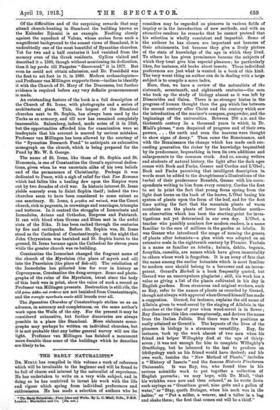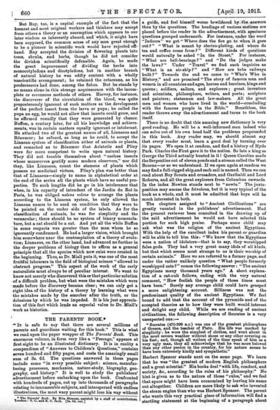THE EARLY NATURALISTS.*
Da. MIA LL has compiled in this volume a work of reference which will be invaluable to the beginner and will be found to be full of charm and interest by the naturalist of experience. He has undertaken to write on a very wide subject, and in doing so he has contrived to invest his work with the life and vigour which spring from individual preferences and enthusiasms. Ke has made a selection of authors who he _ • The Meiji Irafiteraliets : Thairimes.aiut Woi.ks.l3y D.Sc., P.B.S.
London : Macmillan and Co. [10e. net.]
considers may be regarded as pioneers in various fields of inquiry or in the introduction of new methods, and with an attractive candour he remarks that be cannot pretend that his selection is wholly consistent and impartial. Some of the authors he has chosen are important not because of their attainments, but because they give a lively picture of the state of knowledge of the age in which they lived. To others he has given prominence because the subjects of which they treat give him especial pleasure ; he particularly likes, for instance, old books about insects. These individnal preferences are just what is wanted in a book of this kind. The very worst thing an author can do in dealing with a large subject is to compile a mere index.
Here, then, we have a review of the naturalists of the sixteenth, seventeenth, and eighteenth centuries—the men who took up the study of biology almost as it was left by Dioscorides and Galen. There is no stranger hiatus in the progress of human thought than the gap which lies between., the second century after Christ and the century which saw the introduction of the mariner's compass, gunpowder, and the beginnings of the universities. Between 200 A.D. and the- thirteenth century lie a thousand years in which, in Dr. Miall's phrase, "men despaired of progress and of their own powers, . . . the earth and even the heavens were thought to show signs of decay." Then came the Renaissance, and with the Renaissance the change which has made each suc- ceeding generation the richer by the knowledge beqteathed by its predecessor, bequeathing in turn its own additions and enlargements to the common stock. And so, among writers and students of natural history, the light after the dark ages comes with Bock and Fuchs, Gesner and"Corclus and L'Obel ; Bock and Fuchs perceiving that intelligent description in words must be added to the draughtsman's illustrations of the herbal of their predecessor Brunfels, Gesner with his corre- spondents writing to him from every country, Cordus the first to set in print the fact that young ferns spring from the light dust borne on the back of the leaves, L'Obel basing his system of plants upon the form of the leaf, and for the first time noting the fact that the mountain plants of warm countries are the plants of lower levels further north— an observation which has been the starting-point for inves- tigations not yet determined in our own day. L'Obel, a teacher who possibly numbers few modern readers, is a name familiar to the ears of millions in the garden as lobelia. It was Gesner who introduced the usage of naming the genera of plants after botanists—a plan which was adopted on an extensive scale in the eighteenth century by Plumier. Fuchsia is a name as familiar as lobelia; kalrnia, dahlia, begonia, forsythia, camellia, are names which have given immortality to others whose work is forgotten. It is an irony of fate that the name among the earlier botanists which is most familiar to modern ears should belong to a borrower and an incom- petent. Gerard's Herbal' is a book frequently quoted, but Gerard was an unscrupulous plagiarist ; still, his work has a value as giving a list of the plants cultivated in his day in English gardens. Even strenuous and original workers, such as Ray, refer to the names of plants as recorded by Gerard, though not always with approval when Gerard himself has made a suggestion. Gerard, for instance, explains the old name of Alleluia given to wood-sorrel by the singing of Alleluia in the churches at the time of year when wood-sorrel is in flower ; Ray dismisses this idea contemptuously, and derives the name from the Italian Juliola. But there were few positions as easily attained as Gerard's. The keynote of the lives of the pioneera in biology is a strenuous versatility. Ray, far instance, 'took up the work almost of two men when his friend and helper Willughby died at the age of thirty- seven ; it was not enough for him to complete Willughby's Ornithology, but he laboured to the last to produce an ichthyology such as his friend would have desired; and his own work, besides the "New Method of Plants," includes a "History of Insects" and the famous Hisioria Plantarurn Universalis. It was Ray, too, who found time in his 'serious scientific work to put together a collection of English proverbs ; we may hope, with Dr. Miall, "that his wrinkles were now and then relaxed," as he wrote down such sayings as "Grantham gruel, nine grits and a gallon of water," or "Stay, quoth Stringer, when his neck was in the halter," or "Put a miller, a weaver, and a tailor in a bag and shake them; the first that comes out will be a thief." But Ray, too, is a capital example of the fact that the keenest and most original workers and thinkers may accept from others a theory or an assumption which appears to our later wisdom as inherently absurd, and which, it might have been supposed, the common sense of any man great enough to be a pioneer in scientific work would have rejected off- hand. Ray accepted the division of flewering plants into trees, shrubs, and herbs, though he did not consider the division scientifically defensible. Again, he made the great improvement of dividing the herbs into monocotyledons and dicotyledons, but in another branch of natural history he was oddly content with a wholly unscientific arrangement; be retained the cetaceans, as his predecessors had done, among the fishes. But he stands by no means alone in this strange acquiescence with the incom- plete or erroneous methods of others. Harvey, for instance, the discoverer of the circulation of the blood, was quite preposterously ignorant of such matters as the development of the perfect insect from the larva or pupa; he called the pupa an egg, he would not allow that insects could grow, and he affirmed roundly that they were generated by chance. Buffon, a century later, for all his knowledge and achieve- ments, was in certain matters equally ignorant or intolerant. He attacked two of the greatest names of all, Linnaeus and Reaumur; he refused, as long as he could, to accept the Linnean system of classification either of animals or plants, and remarked as to Reaumur that Aristotle and Pliny were far more competent to write upon natural history. They did not trouble themselves about "useless insects whose manceuvres gratify some modern observers," nor did they, like Linnaeus, count the stamens of plants which possess no medicinal virtues. Pliny's plan was better than that of Linnaeus—simply to name in alphabetical order at the end of the series all the plants which have no useful pro- perties. To such lengths did he go in his intolerance that when, in his capacity of intendant of the Jardin du Roi in Paris, he was obliged nolens rolens to arrange the plants according to the Linnean system, he only allowed the Linnean names to be used on condition that they were to be painted on the under side of the labels. As for the classification of animals, he was for simplicity and the vernacular; there should be no system of binary nomencla- lure, but a cat should be a cat. And yet all the while Buffon in some respects was greater than the man whom he so Ignorantly condemned. He had a larger vision, which brought him somewhere near the contemplation of a theory of evolu- tion; Linnaeus, on the other hand, had advanced no further in the deeper problems of biology than to affirm as a general principle that all the species which now exist were created in the beginning. Thus, as Dr. Miall puts it, was one of the most fruitful labourers in the field of biological science "allowed to obstruct progress." This aspect of the work of the early naturalists must always be of peculiar interest. We want to know not merely who discovered this or that particular solution of a difficult problem, but what were the mistakes which were -made before the discovery became clear ; we can only get a right idea of the history of a theory by learning what were the mistakes made by the searcher after the truth, or the delusions by which he was impeded. It is his just apprecia- tion of this fact which lends an especial value to Dr. Miall's work as historian,











































 Previous page
Previous page